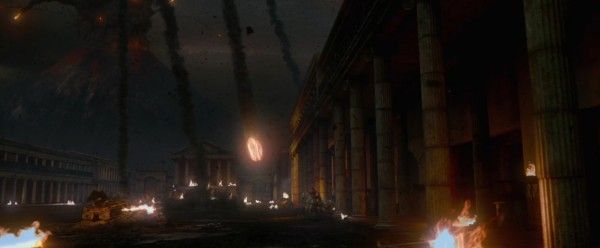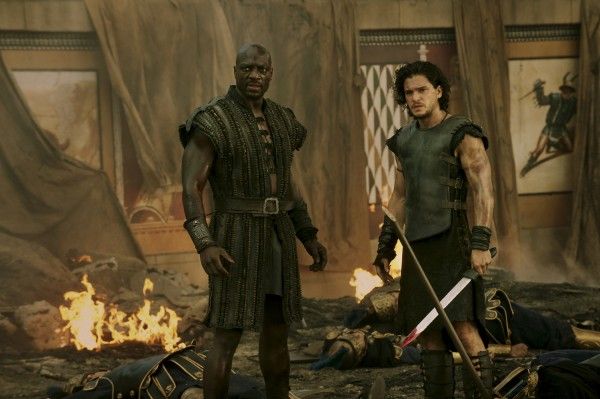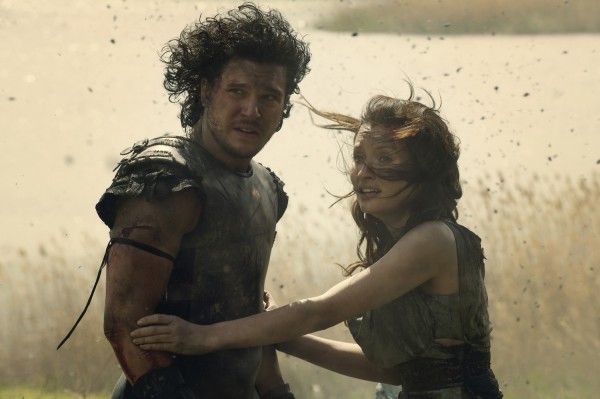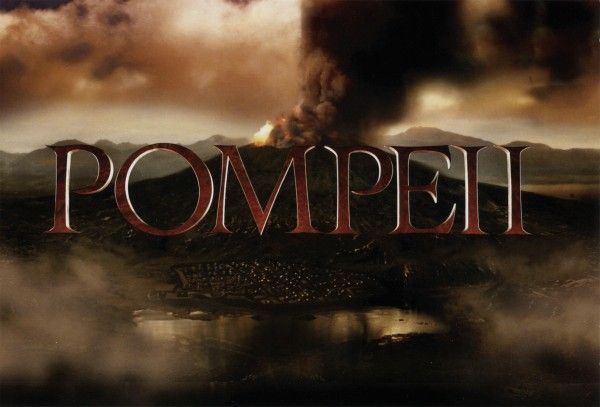Anytime you cast Jared Harris, you’ve made the right choice. Over the past two decades, and especially the last few years with Mad Men, Sherlock Holmes: A Game of Shadows, and Lincoln, Harris has played every type of role and always makes it look easy. In director Paul W.S. Anderson's Pompeii, Harris plays a morally ambiguous businessman that is quickly running out of rope. He also happens to be the father of Emily Browning's character, the story's primary love interest.
During a group interview on set last June, Harris talked about being a fan of disaster movies, how he was cast, his perspective on his character, filming the disaster scenes, why the characters he plays always die, what surprised him to learn about Pompeii, and a lot more. Hit the jump for the interview.
Before going any further, if you haven't watched the Pompeii trailer, I'd watch that first:
Question: The others were talking about how the quality of the script drew them in. Talk a little bit about how you got involved in this one.
HARRIS: Same way that they did, they sent the script and asked if I wanted to be in a Gladiator-cum-I, Claudius-cum-disaster film, sounded fucking great!
Was it Paul who pitched it to you or agents?
HARRIS: Not Paul, it was agents who sent me the script. It was great fun, a lot of very interesting elements.
Have you been crossing your fingers to be in something of this scale?
HARRIS: I've always wanted to be in one of these Greek 300 things. I've been asking Paul if I could please be given a little push during one of these scenes so I end up in the arena with a sword. I'm so close! If someone could just give me a little push in the back.
What's your perspective on this person you're playing?
HARRIS: He's a businessman on the make, he's running out of rope, but keeping up a good façade. Historically speaking Pompeii suffered an earthquake 15 or 18 years beforehand so a lot of the city had been destroyed and was getting rebuilt, so that's a great opportunity to make a lot of money and be involved in the whole building process. He's run out of options so he needs to make a deal with Rome to finish off. The emperor sends Corvis down and seizes the opportunity for himself. He's really making a deal with someone who's ruthless and very dangerous. As he starts to realize that he's also running out of options in terms of what he can do about it. He's a hustler.
A gangster.
HARRIS: He's not a gangster! If he was a gangster he'd have probably fair better with Corvis but he's not violent but Corvis is.
Is this a situation where your character looks bad but as the movie goes on he gets redeemed a little bit?
HARRIS: I'd say he's in a morally ambiguous place because he doesn't know about the interest Corvis has for his daughter. He's not willing to use her in terms of marrying her off, which would have been completely legitimate back then, but he doesn't know that's what Corvis wants. He's certainly willing to have a pretty face distract Corvis while he sets up this deal. He uses people to his advantage. He doesn't prostitute his daughter, but marriages had different meanings back then than they do now, they were used to cement agreements between families, business deals and things like that. The idea of marriages being arranged for love is some sort of modern idea, really.
Are you looking forward to shooting some of the disaster stuff?
HARRIS: To be covered ash? There's a lot of toxic flames. There's a time when we're on set and the makeup person puts a thing up your nose. There's so much black stuff that goes up your nose, but I don't think it gets any worse than that. Characters do get mummified in lava.
Are you a fan of disaster movies and what makes this one a good one?
HARRIS: I am, I loved The Towering Inferno when that came out, and of course The Poseidon Adventure was fantastic. Titanic is a disaster movie. What makes a good one is there has to be an emotional involvement with the people involved in that situation, as well as the spectacle. When you see natural disasters caught on film you realize how well they had been imagined by Hollywood for such a long time. It's all good fun. You never know who's gonna survive and who doesn't.
Do you ever get tired of getting killed in all your projects?
HARRIS: I know! My fiancée said that to me the other day, "When are you gonna do a movie you don't die in?"
You're like Kenny from South Park.
HARRIS: (laughs) That's really good! It is, it's been like five in a row now. Normally death scenes are good, if you have a significant death scene and it means something it's like the audience has an attachment to you being killed that's a good thing. They haven't all been bad guys getting it.
Lane from Mad Men certainly wasn't a bad guy.
HARRIS: Yes, and that was the big emotional punch of that season. When you're being a kid and you're doing that stuff you're always doing these really elaborate death scenes. It's all part of that. Olivier was famous for having great death scenes.
Do you get to do any of the action in this thing?
HARRIS: Tell Paul I'm so close, I'm standing right there in the arena. I'm classically trained, I can do all that stuff. (laughs)
Do you think there's some parallels between Pompeii and today politically or societally?
HARRIS: I think when they're writing the script they're always trying to make it relevant, otherwise you're watching something on the History Channel. It needs to resonate with modern audiences. The trick with that is to make it resonate with modern audiences but make it still seem like we understand how they lived back then. There's a timeless element to it, which is the "across the tracks" love story, it has that Romeo and Juliet element to it. In that sense that seems to be something that teen audiences are attracted to, that love will kill you. You'll love somebody so much that it will burn you out, and that seems to be an element behind all the Hunger Games. In terms of the politics of it, it's cynical. Politicians are corrupt. I would say Severous is a good man who goes down a bad path. We always hope we will do the right things and people will go into business professing to wanting to do it for the good of the community. It's cynical in that sense because people are cynical about government and business these days, corporations.
Once you landed the role you must have done a lot of research. What was one of the things that surprised you to learn about the actual incident of Pompeii?
HARRIS: You see all those images that are really familiar, but I read a lot of Seneca's letters and stuff like that to understand the mindset of the people. He was complaining that the nouveau riche didn't know how to treat their slaves. The point that he made was just because you were born a free man didn't mean you wouldn't end your life as a slave. There were some famous examples of that. In the old patrician world there was a custom once a week you had to eat a meal with your slaves and get to know them as people. Amongst the new class of people they treated them really badly, they didn't understand that it was just fate that cast someone into this role rather than a different path. That and the argument of the way military veterans are treated. Thank God we don't have slaves now, but people argued about how we treat people even in extreme circumstances as that.
What's in the future?
HARRIS: The last gig I did was Mortal Instruments. I did a horror movie earlier last year in England, Lionsgate are gonna release it next year. It's connected to Canada, an experiment a Canadian mathematician came up with to see if he could produce supernatural events scientifically. He got a bunch of people together who had no psychic ability and invented a ghost, someone who fought during the English civil war. They did no historical research so they got a lot of information wrong and never tried to correct it. After a year of talking about this person they started to get responses back, bangings, table lifting, stuff like this. It got quite elaborate. They actually did it in the TV studio here in Toronto. He's not saying there's evidence of a supernatural existence, but this was the outpouring of the people's psyche. In our movie, which is a thriller, once they get the results things start to go horribly wrong. The genie comes out of the box and they can't put it back in. In the real experiment they decided that each time they would meet they would not have a bad experience, anytime it started to go off into a weird direction he'd end it, but in this one they don't do that.
Check out some of my other coverage from the set visit:
- 5 Major Takeaways and 65 Things to Know About Director Paul W.S. Anderson's POMPEII From Our Set Visit
- Kit Harington Talks Bulking Up for the Role, His Love of Action, the Popularity of GAME OF THRONES, and More on the Set of POMPEII
- Kiefer Sutherland Talks Playing the Bad Guy, the Production Value, Looking Back on His Career, the Return of 24, and More on the Set of POMPEII
- Director Paul W.S. Anderson Talks Building Practical Sets, Expanding into Love Story Territory, and More on the Set of POMPEII
- Producer Jeremy Bolt Talks Shooting in Canada, Drone Cameras, How Much of the Film Is Factual, 3D, and More on the Set of POMPEII




